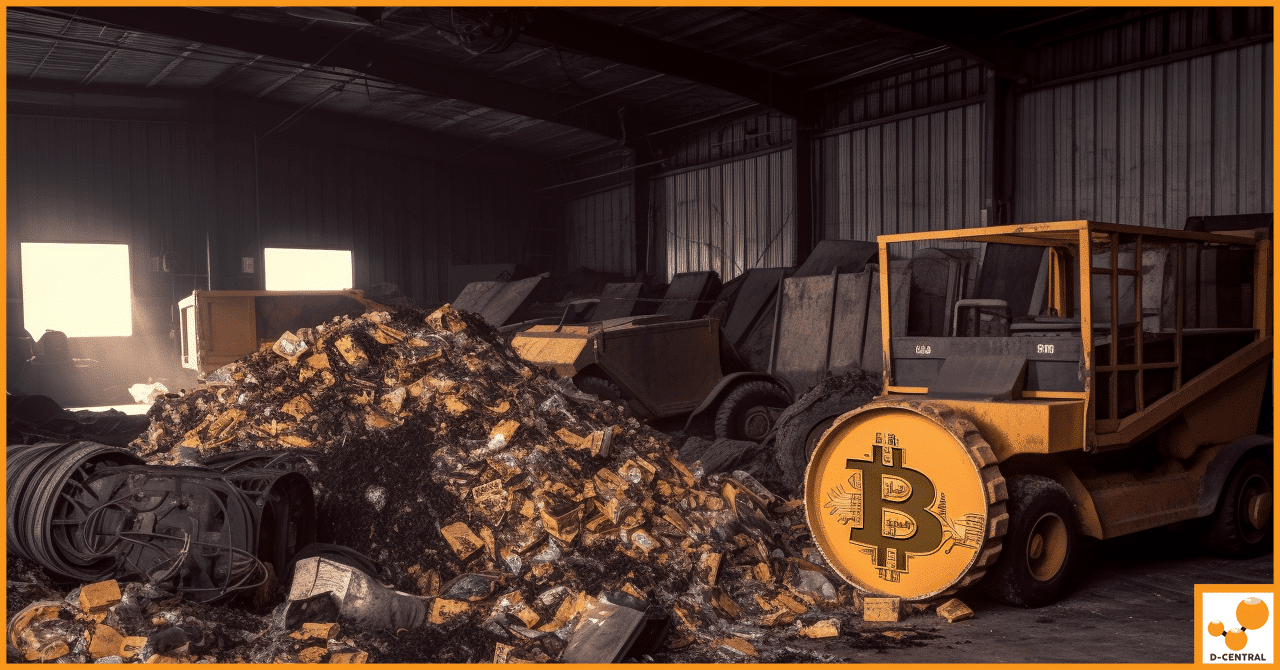
Maximize Efficiency with Dual-Purpose Miners for Bitcoin and Home Heating
Discover how D-Central’s innovative dual-purpose miners can transform your living space, combining Bitcoin mining with efficient home heating. Maximize your
4479 Desserte Nord Autoroute 440, Laval, QC H7P 6E2

In the dynamic world of cryptocurrency mining, Application-Specific Integrated Circuit (ASIC) miners have emerged as the gold standard for those serious about maximizing their digital currency earnings. Unlike their more generalized counterparts, ASIC miners are designed with a singular focus: to mine a specific cryptocurrency with unparalleled efficiency and speed. This specialization not only maximizes profitability but also significantly reduces the power consumption per unit of cryptocurrency mined, making ASIC miners an indispensable tool for modern miners.
However, as the demand for these powerful devices has surged, so too has the attention of opportunistic scammers looking to exploit the burgeoning market. The online marketplace, vast and varied, has unfortunately become a fertile ground for such fraudulent activities. Scammers, armed with sophisticated tactics, have been increasingly targeting unsuspecting buyers with offers of counterfeit or non-existent ASIC miners, often leading to significant financial losses for the victims.
The rise of these online scams underscores the critical importance of due diligence before making any purchase in the realm of cryptocurrency mining hardware. The allure of high returns from mining operations can often cloud judgment, leading individuals to overlook the red flags that typically accompany fraudulent offers. It is essential, therefore, for buyers to arm themselves with knowledge and to approach each transaction with a healthy dose of skepticism. Verifying the credibility of sellers, understanding the technical specifications of the hardware, and being aware of the market’s standard pricing are just a few of the steps that can safeguard one’s investment from the clutches of online scams.
In this context, the significance of due diligence cannot be overstated. It serves as the first line of defense against the sophisticated schemes of scammers, ensuring that the investment in ASIC miners contributes to the intended outcome: the profitable and efficient generation of cryptocurrency. As we delve deeper into the intricacies of spotting scams in the ASIC miner market, remember that an informed buyer is not only a smart buyer but also a protected one.
The realm of ASIC miner transactions is not immune to the dark underbelly of online scams, which have evolved in sophistication and scale alongside the growth of the cryptocurrency market. Understanding the landscape of these scams and recognizing the red flags can be your best defence against falling victim to such fraudulent schemes.
ASIC miner scams manifest in various forms, each designed to exploit the enthusiasm and sometimes the naivety of buyers looking to enter or expand their presence in the cryptocurrency mining space. Here are some common types of scams encountered in the ASIC miner market:
Spotting a scam before falling prey to it can save both your finances and your faith in the cryptocurrency mining industry. Here are some red flags to be mindful of when purchasing ASIC miners online:
By familiarizing yourself with the landscape of ASIC miner scams and the associated red flags, you can navigate the market more safely and confidently. Remember, due diligence and a healthy dose of skepticism are your best tools against falling victim to these fraudulent schemes.
The allure of cryptocurrency mining has not only attracted genuine investors and enthusiasts but also a slew of scammers looking to exploit the booming market. These scammers employ a variety of tactics to deceive unsuspecting buyers, from presenting irresistible deals to fabricating social proof. Understanding these tactics is crucial in navigating the market safely.
One of the most enticing lures used by scammers is the promise of ASIC miners at prices that seem too good to be true. This tactic preys on the buyer’s desire for a great deal and their fear of missing out on a limited-time offer.
How to Spot Unrealistic Offers:
Fake reviews and testimonials are another common tactic used by scammers to build a facade of trust and reliability. These fabricated endorsements are designed to manipulate potential buyers into believing that the seller or product is reputable and trustworthy.
The Role of Fake Reviews in Scams:
How to Discern Genuine Feedback:
Phishing and impersonation involve scammers pretending to be reputable sellers or companies to steal personal and financial information. This tactic can be particularly insidious as it exploits the trust buyers place in established brands.
Explanation of Phishing Scams and Impersonation:
Protecting Yourself:
By staying vigilant and informed about these common scamming tactics, buyers can better protect themselves from falling victim to fraudulent schemes in the ASIC miner market. Always approach deals with a critical eye and conduct thorough research before committing to a purchase.
In the pursuit of ASIC miners, due diligence serves as a critical checkpoint that safeguards buyers from potential scams. It involves a series of investigative steps aimed at verifying the credibility of the seller, ensuring the security of payment methods, and confirming the authenticity and quality of the product. This meticulous approach is indispensable for anyone looking to invest in ASIC mining hardware.
The legitimacy of the seller or platform is foundational to a secure transaction. Here are steps to research and verify seller credibility:
Choosing secure and traceable payment options is crucial for financial protection. Here’s a discussion on selecting the right payment methods:
Understanding the technical specifications and warranty policy of the ASIC miner is essential to ensure that the product meets your mining needs and offers protection against defects.
By conducting thorough due diligence encompassing these critical areas, buyers can significantly reduce the risk of falling prey to scams and ensure a secure and satisfactory purchase of ASIC miners.
Navigating the ASIC miner market requires not only a keen eye for detail but also an understanding of the broader ecosystem, including mining pools and cloud mining contracts. Advanced knowledge in these areas can significantly enhance your ability to spot potential scams.
Mining pools are collectives of miners who pool their computational resources to increase their chances of mining a block and receiving rewards. The legitimacy of these pools is crucial, especially when they’re associated with ASIC miner sellers.
How to Check the Legitimacy of Mining Pools:
Cloud mining allows individuals to participate in cryptocurrency mining without owning or managing physical hardware, through the purchase of cloud mining contracts. However, this area is ripe for scams, making scrutiny essential.
Tips for Evaluating Cloud Mining Contracts:
By applying these advanced tips for analyzing mining pool associations and scrutinizing cloud mining contracts, you can better protect yourself from sophisticated scams in the ASIC miner market. Remember, thorough research and a critical approach are your best defenses against fraudulent schemes.
In the complex and rapidly evolving world of cryptocurrency mining, the collective wisdom of the community and the availability of dedicated resources play a pivotal role in safeguarding investments. Engaging with crypto communities and utilizing scam reporting websites can provide invaluable insights and warnings about potential scams in the ASIC miner market.
The cryptocurrency community is a rich tapestry of enthusiasts, experts, and miners who share a common interest in the growth and security of the crypto ecosystem. Participating in these communities can offer a wealth of knowledge and firsthand experiences that are crucial for making informed decisions.
The Importance of Community Engagement:
Popular platforms for community engagement include Reddit (subreddits like r/BitcoinMining and r/CryptoCurrency), Bitcointalk forums, and social media groups on platforms like Facebook and Telegram.
Scam reporting websites and online review platforms are essential tools for conducting due diligence. These resources aggregate reports and reviews from individuals who have encountered scams, providing a centralized database that can help you identify fraudulent sellers and products.
Resources for Checking Scam Reports and Reviews:
Before making any purchase or investment, it’s advisable to search for the seller or service on multiple scam reporting websites and review platforms. Consistent negative reports and reviews across different sources can be a strong indicator of a potential scam.
By actively engaging with crypto communities and utilizing scam reporting websites, you can tap into a wealth of collective knowledge and cautionary tales that will empower you to navigate the ASIC miner market with greater confidence and security.
Falling victim to a scam can be a distressing experience, but it’s crucial to know that there are steps you can take to seek justice and potentially recover your losses. Equally important is learning from the experience to better protect yourself in future transactions.
If you find yourself the victim of an ASIC miner scam, immediate action can help mitigate the damage and increase the chances of recourse.
Learning from a scam experience is crucial for enhancing your vigilance and security in future transactions. Here are strategies to bolster your defenses:
By taking these steps if scammed and adopting a proactive approach to personal security, you can not only navigate the aftermath of a scam more effectively but also fortify yourself against potential scams in the future. Remember, vigilance and education are key components of safe online transactions, especially in the high-stakes world of cryptocurrency mining.
Navigating the online marketplace for ASIC miners can be a daunting task, fraught with potential pitfalls and scams designed to prey on the unwary. However, armed with the right knowledge and a vigilant approach, investors can significantly mitigate the risks and make informed decisions that safeguard their investments.
We’ve explored the landscape of ASIC miner scams, highlighting common tactics used by scammers, such as too-good-to-be-true prices, fake reviews, and phishing attempts. Understanding these red flags and knowing how to conduct thorough due diligence before making a purchase are crucial steps in protecting oneself from fraudulent schemes.
Engaging with the crypto community and leveraging scam reporting websites can provide additional layers of insight and security, offering real-time alerts and shared experiences that can guide your decisions. Should the worst occur, knowing the steps to take in the aftermath of a scam, from reporting to authorities to enhancing future transaction security, can help in navigating the situation with confidence.
The crypto mining industry, while offering substantial opportunities for growth and profit, demands a high level of vigilance and informed decision-making from its participants. The allure of quick gains should never overshadow the importance of thorough research and caution.
At D-Central Technologies, we understand the challenges and uncertainties that come with purchasing ASIC miners online. That’s why we are committed to providing a scam-free, transparent, and reliable platform for all your ASIC miner needs. Our reputation as a trusted provider in the industry is built on our dedication to customer satisfaction and our comprehensive approach to ensuring the authenticity and quality of our products.
For those looking to invest in ASIC miners, we offer expert consultation services to guide you through the selection process, ensuring that your investment aligns with your mining goals and risk tolerance. Our team is here to support you every step of the way, from initial inquiry to post-purchase support.
In the dynamic world of cryptocurrency mining, the partnership with a reputable and experienced provider like D-Central Technologies can be your key to a successful and secure mining venture. Visit us today to explore our range of ASIC miners and discover how we can help you achieve your mining aspirations safely and efficiently.
What are ASIC miners?
ASIC miners are specialized devices designed for cryptocurrency mining. They offer unparalleled efficiency and speed for mining a specific cryptocurrency, which maximizes profitability while minimizing power consumption.
How do ASIC miner scams work?
ASIC miner scams can take various forms, including non-delivery scams, selling counterfeit hardware, overpriced hardware sales, cloud mining scams, and Ponzi or pyramid schemes. Scammers exploit buyers’ enthusiasm and lack of knowledge to defraud them.
What are some red flags of ASIC miner scams?
Red flags include prices that seem too good to be true, lack of verifiable seller information, pressure to pay quickly, inconsistent communication, poor online presence, unusual payment methods, and no warranty or return policy.
How can I protect myself from ASIC miner scams?
Protect yourself by verifying seller credibility, choosing secure and traceable payment methods, understanding the technical specifications and warranty of the product, engaging with the crypto community, and utilizing scam reporting websites.
What should I do if I fall victim to an ASIC miner scam?
If scammed, document everything, report the scam to local authorities and financial institutions, contact cybercrime units, use online reporting platforms, and consider seeking legal advice. Enhancing due diligence and digital security practices for future transactions is also crucial.
Why is due diligence important when purchasing ASIC miners?
Due diligence is the first line of defense against fraudulent schemes, ensuring that your investment in ASIC miners leads to profitable and efficient cryptocurrency generation rather than financial loss.
How can D-Central Technologies assist with ASIC mining?
D-Central Technologies offers a scam-free platform for purchasing ASIC miners, providing expert consultation to align investments with mining goals. They ensure the authenticity and quality of their products and support customers from initial inquiry to post-purchase.
DISCLAIMER: D-Central Technologies and its associated content, including this blog, do not serve as financial advisors or official investment advisors. The insights and opinions shared here or by any guests featured in our content are provided purely for informational and educational purposes. Such communications should not be interpreted as financial, investment, legal, tax, or any form of specific advice. We are committed to advancing the knowledge and understanding of Bitcoin and its potential impact on society. However, we urge our community to proceed with caution and informed judgment in all related endeavors.
Related Posts

Discover how D-Central’s innovative dual-purpose miners can transform your living space, combining Bitcoin mining with efficient home heating. Maximize your

Recycling facilities are key players in reducing waste and promoting a circular economy. By collecting and processing various types of

Bitcoin, the first and most well-known cryptocurrency, emerged in 2009 as a revolutionary digital currency that operates independently of a